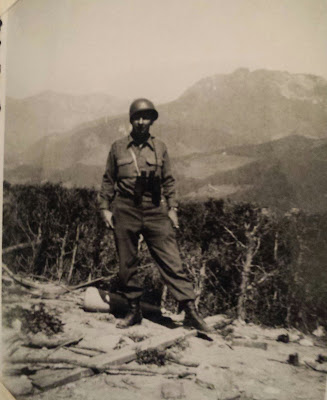The Battle of Monte Cassino (also known as the Battle for Rome and the Battle for Cassino) was a costly series of four assaults by the Allies against the Winter Line in Italy held by Axis forces during the Italian Campaign of World War II. The intention was a breakthrough to Rome. --Wikipedia
Diary Entries:
April 1-1944 At machine gun from 4-7 p.m. Very few shells going out, and none came in. Warm day. Cleaned up around our door.
April 2--Palm Sunday. At the machine gun again in the morning, and missed the church service. Shells came in during the night. It was a beautiful day outside.
April 4--At machine from 4-8 p.m. Took a sunbath and got sunburned. Shells came in through the night. A lizard crawled into bed with me. Lots of German shells landed in "C" Battery area. The front now is just about deserted. Very few outfits left here. No traffic on the roads, since everyone has gone to 10 Corps or Anzio Beachhead. The only ones here now are New Zealanders and British. Very few Americans, and very little artillery fire.
April 6--A British 25-pound shell hit into our cave up at our left Observation Point and injured a Sergeant. Three more British 25-pound shells hit up on Mt. Trocchio above me. The British don't care if their shells hit their target or not. No shells coming in. The Germans are supposed to be out of ammunition.
April 9--Easter Sunday. Went to a service, then back on duty at the machine gun from 12-4 p.m. Lots of shells coming in, so spent some time in my foxhole.
April 15--Got up at 4:30 a.m. and a group of us went back to Naples in trucks. Took a trip to Pompeii, built in 600 A.D. Over 16,000 people lived there before the city was destroyed by Mt. Vesuvius (I could see the smoke coming out of the mountain). Went all over Naples, and had a wonderful time. Got back up at the front at 8 p.m.
April 26--Last night at 9:45, eight shells came in. They started the ammunition dump near us on fire. Shells and rockets were flying everywhere. There was a big explosion, and I thought the house was going to fall down. Some of the boys got in a panic and wanted to leave without orders, but we stuck it out. The flames lit up the skies for miles. British Fire Fighters put the fire out.
Letter Home from Robert to His Family: "April 9, 1944--This morning, all of the US soldiers were saying 'Happy Easter' to each other. I thought back to my last Easter, when I was at Camp Roberts, California, and the Easter before that, when I was at home. I always loved the Sunrise Services on Easter morning. I just finished eating my Easter dinner, and now I am on my way to the machine-gun pit. This morning, I went to an Easter service, and the Chaplain preached a good sermon. I hope you are all having a great day, and that you received the flowers I sent to you. This evening, I got a V-Mail from you, and also an Easter card. Love and Kisses, from your son Robert".











































